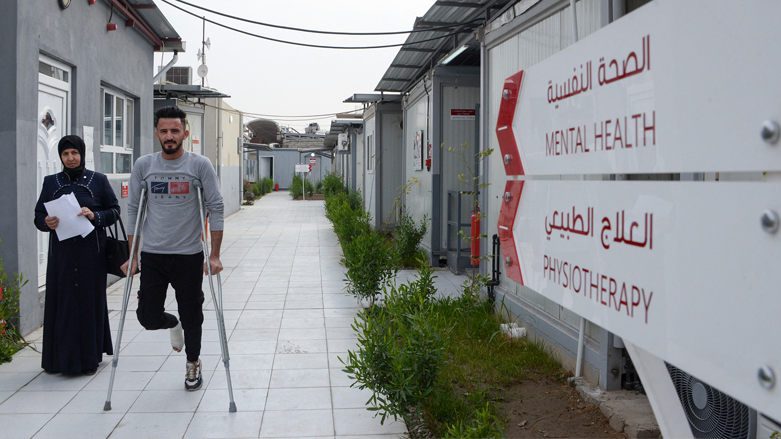More support needed for mental health in Kurdistan and Iraq: experts

ERBIL (Kurdistan 24) – The SEED Foundation based in Erbil on World Mental Health Day on Monday said there is a need for more support needed for mental health in the Kurdistan Region and Iraq, especially now that also more NGOs are leaving the country and funding is shrinking - particularly for mental health.
“There is a mental health crisis in Kurdistan, driven by repeated and prolonged conflict, violence, displacement, poor economic conditions, and a lack of available resources. The mental health needs are rapidly growing, while available services are shrinking,” the SEED Foundation said on World Mental Health Day.
“Individuals from across Iraq and Kurdistan - in particular women - continue to report limited or restricted access to mental health services,” SEED said.
SEED has provided psychotherapy, counseling and social work services in the Kurdistan Region and has a special program for Mental Health and Psychosocial Services with a focus on survivors of sexual violence.
Moreover, the SEED Foundation in January signed a Memorandum of Understanding (MoU) with the University of Kurdistan Hewlêr (UKH) to improve the mental health awareness and understanding of between 300-500 students in Psychosocial Support (PSS) awareness.
Furthermore, the British Journal of Psychiatry, said that in 2021 there were only 100 psychiatrists in Iraq, that's 0.34 per 100,000 population. (compared to 8 per 100,000 in the UK).
According to the General Directorate of Community Police, 420 individuals have taken their lives in different areas of Iraq in the first 9 months of the year. 2021 saw over 770 individuals die by suicide, approximately 100 more cases that the year prior.
"Even before the pandemic, an estimated one in eight people globally were living with a mental health disorder. At the same time, the services, skills and funding available for mental health remained in short supply, and fell far below what was needed, especially in low and middle income countries,” Sherri Kraham Talabany, Co-Founder and President of SEED Foundation, told Kurdistan 24.
Mental health crisis
“Today in a post-pandemic Kurdistan, a mental health crisis continues to grow. Many individuals are forced to ignore or deprioritize their mental health as a result of stigma, lack of access to services or the limited availability of specialized and comprehensive support.”
Moreover, she added that NGOs and UN agencies are struggling to secure long-term funding for mental health support, “with humanitarian needs or emergency medical care having always taken precedence.”
“And while we must have our basic needs met (food, water, shelter etc.), a failure to meet these needs can result in further issues - such as post-traumatic stress, depression or anxiety. When we forget to prioritize our mental health, all aspects of our lives are negatively impacted. The need to invest in long-term and sustainable mental health care and systems has become even more stark in light of the impending transition of Iraq from a humanitarian to a development designation,” she concluded.
Clinical Child Psychiatrist and former Director General of the Duhok Directorate of Health, Dr. Nezar Ismet Taib, told Kurdistan 24 that the “biggest challenge is the huge demand and need of mental health services and the lack of good infrastructure and human resources that can provide such services. There is a mismatch between the resources available and the demand.”
Collective trauma
Moreover, he added there is a “kind of collective trauma – transgenerational trauma – and adding to that all the atrocities that people endured and especially after the war against ISIS for all these displaced people who are in Kurdistan.”
He added that stigma in Kurdistan from mental illnesses is also a barrier that people will not seek services in early stages of suffering.
“And any delay in seeking support could complicate the cases and make treatment difficult. We can only change this by raising awareness and talking about mental health as a part of public health services – in media and education – and integrating mental health into primary health care,” he added.
Moreover, he said mental health is not seen as a priority for the Iraqi and Kurdish governments.
Read More: Years after war, health sector ailing in Iraq's Mosul
“That may be because there are many other competing priorities like communicable diseases and in the past years, the pandemic. There is also a lack of strategy, which would help to understand where to invest their efforts in providing services.”
Lack of support
“Unfortunately, there is not enough support for mental health in Kurdistan – neither from the government nor from the international agencies (UN and NGO). The latter lacks the interest of international donors who are prioritizing other countries with serious problems – such as Ukraine. With a lot of displaced people living in Kurdistan, the burden of mental health is huge, but the support is not enough,” said Dr. Nezar Ismet Taib.
Read More: KRG, international organizations launch juvenile mental health hotline
Nevertheless, the KRG has also focused on mental health problems in the Kurdistan Region.
The Kurdistan Region’s health ministry last year in cooperation with international organizations on Monday launched a new hotline for juvenile mental health services across the region.
The hotline is available for calls for under-18s for mental health concerns, including addiction, family issues, emotional support, and reproductive concerns.
